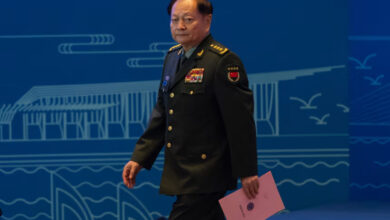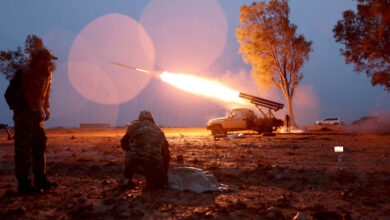For many people, the recent church attack in Imbaba has raised larger questions about the current state of affairs in Egypt. Some are wondering why the Supreme Council of the Armed Forces (SCAF) did not intervene to prevent Salafis from protesting in front of the Coptic Cathedral in Abbasiya two weeks ago. Why weren’t the organizers of those protests immediately investigating for inciting sectarian tensions. The Minister of Justice, Mohamed al-Guindy, had recently re-affirmed a legal prohibition against demonstrations in front of places of worship. If the SCAF had dealt firmly with these protests it may have deterred Salafis from going to Imbaba and threatening to storm the St. Mina Church on Saturday (threats that were documented on video and circulated on the internet).
Why did the SCAF not summon Kamilia Shehata to the general prosecutor’s office to reveal the truth about her controversy? Why were thousands allowed to gather in front of St. Mina church and why didn’t the military police break up the protest by force? Are electric batons only used against activists in Tahrir and Cairo University? Why was the gathering in Imbaba not dealt with as firmly as the protests on 9 March and 9 April in Tahrir square?
Why did SCAF not ask the Muslim Brotherhood, to whom it gave preferential treatment in the constitutional amendments committee, to play a more decisive role in combating sectarianism? This would have given the movement an opportunity to demonstrate its self-proclaimed popularity. Or is the Muslim Brotherhood only called upon when there are political benefits involved?
Why isn’t SCAF doing more to protect police stations and hospitals, which have been routinely attacked since the early days of the revolution? Why does the military tolerate the police’s laxity instead of punishing officers who do not perform their duties? Why has SCAF not responded to the Coalition of Police Officers’ demand to dismiss and investigate security heads who aided ex-Interior Minister Habib Al-Adly? Why does SCAF give qualified second-rank officers in the Interior Ministry the chance to demonstrate their ability to maintain security?
Why have former State Security officers and criminal investigators not been asked to submit all the information they posses regarding thugs and Salafis to the military, as both groups bear responsibility for stirring up chaos in Egypt?
SCAF must know that a failure to address these issues will impede its ability to meet the demands of the revolution. The SCAF has apologized for the use of violence against protesters in the past. What happened to this wonderful spirit? Why haven’t they admitted to their more recent mistakes: appointing governors from Mubarak’s security apparatus; supporting an ex-ruling party official, Mostafa al-Fiqi, as the next secretary general of the Arab league; and allowing other ex-party members, like Sami Sherif, to preside over state media during this difficult period?
I've repeatedly said that our faith in the military has no limits and that the army has emerged from the Mubarak-era as a strong state institution. At the same time, I also insist that the SCAF should not be immune to criticism. As someone who is concerned about Egypt, I believe that if the SCAF does not address these questions promptly, it will pave the way for more skepticism about who is actually behind the current chaos. Some have already started to wonder whether the SCAF intends to remain in power longer than it has promised. Is the SCAF hoping that more Egyptians will reach this conclusion out of fear?
The SCAF has pledged not stay in power longer than is required to hold parliamentary and presidential elections because doing so would not be in Egypt’s national interest. Egyptians believe the army’s promise to transfer power to an elected civilian government with a popular mandate. Egypt currently faces many challenges. The country’s economic situation is dismal. Armed thugs that thrived during Mubarak’s era will not surrender easily. Israel remains intent on preventing Egypt from regaining its position of leadership in the Arab world. We know it’s almost impossible for the SCAF to talk directly to the public about all this. But we need some answers to the many questions that concern us. The current moment requires honesty; that’s the only way to save this country.
Over the past few weeks, the SCAF has come to realize that most Egyptians did not chant “The Military and the People are One Hand” out of fear. They sincerely believed in the military to protect the revolution. People were keen on maintaining the military’s unity under all circumstances. At the same time, however, people believed in the SCAF's pledge to achieve the demands of the revolution. And many of us are still confident that the SCAF will remain faithful to this promise. For that reason, we await clear answers to these questions. The present moment demands openness, openness and more openness.
Translated and abridged from the Arabic Edition.




